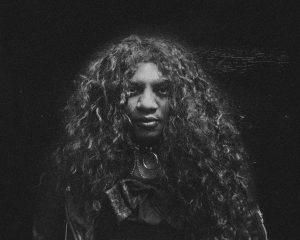When we join Ashanti Mutinta (a.k.a. Backxwash) by phone, she’s still in disbelief.
 Two weeks ago, her second album God Has Nothing to Do With This Leave Him Out of It was short-listed for the Polaris Music Prize, which annually celebrates the best Canadian album, regardless of genre or sales. “I didn’t expect this album to go this far,” says the rapper/producer, who’s also the first female hip-hop artist from Québec to ever earn such a nomination. “I’m truly honoured!”
Two weeks ago, her second album God Has Nothing to Do With This Leave Him Out of It was short-listed for the Polaris Music Prize, which annually celebrates the best Canadian album, regardless of genre or sales. “I didn’t expect this album to go this far,” says the rapper/producer, who’s also the first female hip-hop artist from Québec to ever earn such a nomination. “I’m truly honoured!”
Apart from a few media outlets that have highlighted this accomplishment, the Zambia-born Montréaler hasn’t received many kudos from the Québec hip-hop community. “To be honest, I don’t think I’ve been included [in that scene] at all. I feel quite isolated,” she says.”The first Spotify playlist to include one of my songs was Northern Bars, and it’s from Toronto. Maybe my style doesn’t speak [to people in Québec] as much?” she wonders, sincerely.
It’s true that her music has little in common with the legacy of Sans Pression, Muzion, and other pioneers of Québec rap. Inspired by Black Sabbath and Nine Inch Nails, both of whom she’s sampled on her sophomore album, the Anglophone rapper also has a penchant for the biting hip-hop of American rappers such as Danny Brown and JPEGMafia, as well as for the audacity of Moodie Black — a band that pioneered the noise-rap movement that culminated with Death Grips in the past decade.
Even more intense than Deviancy, her first album — which is filled with tinges of nu-metal, trap, and horrorcore — GHNTDWTLHOOI adds touches of industrial and doom metal. “Deviancy was a good headbanging album, but with this one, I was looking to express my emotions through my music,” she says. “I think I’ve finally found a sound I’m comfortable with.”
Backxwash had to revisit her past to get to this point. “This album is a turning point in my life,” says the artist, who left Zambia over a decade ago. “I wanted to speak to that child who cried every night because of their extreme vulnerability. The lyrics just flowed out of me like never before in my life.”
“I told my mama that the devil got a place for me” she sings on “Spells,” a song about her Christian upbringing. “The person I am now is the opposite of that hyper-Christian child,” says the transgender artist, who still believes in God, “but not in a traditional way. That song is part of my healing process.”
Religion is indeed a central theme in jher songs. She’s sampled many Christian metal songs for her next EP, Stigmata, slated for late July, just as she’s sampled a dance ceremony from her homeland on “Black Sheep,” one of the most personal songs on GHNTDWTLHOOI. In the Nyau community, a secret society that is part of her Chewa ethnic group, this dance names Gule Wamkulu is the final stage of a ritual initiation that welcomes young men into adulthood. That dance is on the UNESCO’s List of the Intangible Cultural Heritage of Humanity and it symbolizes a lot for a woman who left her country of origin for good. “That song is part of my healing process, and it talks about my family and what I went through over there. Now I can finally heal,” she says, adding that it wouldn’t be safe for her to go back to Zambia.
Yet, the sum total of growing up in Africa also has a positive side. That’s where, after all, she fell in love with American hip-hop, thanks to Notorious B.I.G.’s video for “Mo Money Mo Problems.” “I was nine or 10 when I saw it for the first time, and it completely rocked my world,” she says. “Notorious looked so cool! I started trying to rap like him by transcribing his words,” explains the artist, who also started making beats in her early teens.
That’s also when she started thinking about her identity. “I was asking myself a lot of questions over there, but I only felt the freedom to assume myself [as I am] when I arrived in Montréal,” in 2017, after spending eight years in British Columbia. The song “Adolescence” is dedicated to her younger brother, who still lives out West. “I don’t know if he’s heard that song… We don’t really speak to each other in my family,” she says.
“I guess maybe I should go to therapy / Cause keeping it inside is something that is eating me alive,” she sings, with disarming calm, on the painfully sincere song. On a more abrasive tip, “Black Magic” talks about the anxiety of an artist who prefers to continue her habits ”instead of getting help,” as she says herself on the Rap Genius platform.
Backxwash assures us that there’s still hope, pointing out “Redemption,” the closing song on GHNTDWTLHOOI. “I wouldn’t go as far as saying that it’s a transition towards light, but it does represent the hope [for such transition] in a certain way,” she says. “There still remains a part of uncertainty, however. I still need to ask myself a lot of questions and to change a lot of things in my life.”